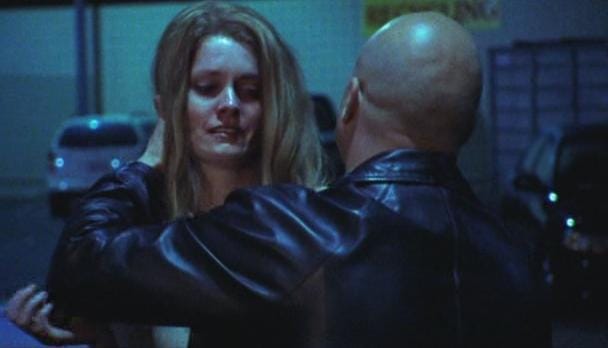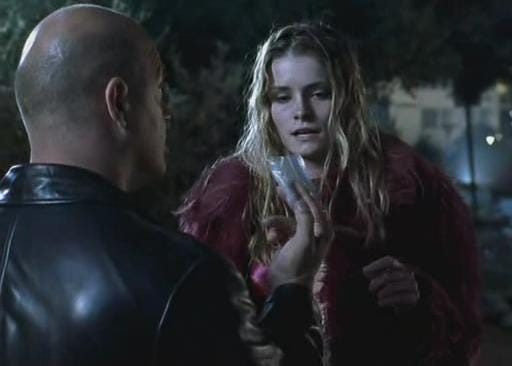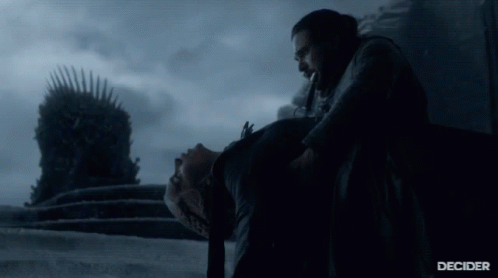Fatal Choices
The most dramatic moments in a book or a show are marked by choices that will make or break your characters, and therefore your story, based on how much theme has seeped into them.
In The Shield, Season 1, agent Vic Mackey often seems more attached to Connie Riesler, a prostitute he helps keep out of trouble, than his own wife.
Time and time again, Vic turns a deaf ear to his wife, who pleads with him to help more at home, especially now that they’ve found out they have an autistic kid. But Vic is the head of the Strike Team, a dirty bunch of cops ready to do just about anything to get rid of criminals while making a pretty penny on the side.
What’s interesting is that Connie, the prostitute, sees Vic for who he is. Vic can be himself around Connie. She represents something special to him. To be completely honest with you, though, the storytelling is not so good that you could tell what exactly she represents. It’s much clearer, for example, that Jessie is Walter White’s proxy son in Breaking Bad. Here, Connie is… important. We don’t exactly know why. However, we do know something about Connie.
She has a child, and, more importantly…
She’s an addict.
When Connie’s mother dies, she has no choice but to try and get clean. While doing so, Vic takes the baby and brings it to his own wife, who had been struggling to keep the family together. What happens in the end is that Connie doesn’t get clean—she uses drugs again. Vic’s wife, overwhelmed by having to take care of the family and Vic’s dirty cop problems, finally reaching his house and forcing him to put his family in a motel, decides to leave him in a dramatic finale for season 1.
What’s most interesting is that Vic did have a choice, albeit glossed over by the writers: Vic could have sent the child of a user to child services and Connie to rehab (which even his wife suggested), and he could have spent extra time taking care of his family, making sure that his two lives stayed separate.
Vic’s choices triggered the chain of causality, inevitably leading to his wife's departure. The problem, however, is that the chain of causality was muddled. It’s not clear why he’s so attached to Connie. It’s not clear why he doesn’t find a way to send her to rehab without her having to lose custody of her son. We’re talking about a cop who shot a colleague in episode 1 to make sure he couldn’t be ratted out: what’s stopping Vic from using his dark side for good? Did the writers simply not think about it? Did they fear that it would give too much justification to the bad shit he pulls? Who knows.
What we know, instead, is that there’s not a clear Theme. It’s not clear that there’s something in there that hypercharges the storytelling. Walter White’s tale is one of hubris, Ned Stark’s one of duty, and Don Draper's one of living a lie. Knowing what a story is about gives you the tools to infuse it into the choices. When Don Draper refuses to stop living the lie by not accepting his old brother into his new life, he triggers his brother’s suicide, which in turn marks the point where Don’s own life is about to go to shit. When Ned Stark puts the safety of his daughters in front of his duty, as Maester Aemon warns Jon Snow not to do about 10-20 minutes before in the same episode, and agrees to sign a fake confession and beg Joffrey to be pardoned, his head rolls. Walter… you go watch Breaking Bad again and see what happens every time he chooses hubris, he’s refusing the call.
All those lives turn to tragedies because the writers create a potential hero’s journey for the main character, wittingly or not, and then they have the characters choose comfort. In storytelling, refusing the call always equals tragedy. Not being able to move on, explore the dark lands, and come back to the community with an elixir is an extremely ominous sign.
The Soprano's entire schtick could be summed up as ‘times are moving forward, but the mob stayed the same.’ Its entire premise is about mobs in modern times. It’s not just about the mob. It’s about how now they turn onto each other, how old conventions are not respected anymore, and how you cannot ask for protection money from Starbucks.
Most importantly, it’s about fatal choices. In its etymological sense. Choices dictated by fate.
Defining Theme
So, what does a Theme do, and what is a Theme? Let’s see what someone else said about it.
Theme creates character, which in turn creates plot, which brings the circle all the way around and, in turn, generates theme, which creates character which creates plot which creates… ad infinitum. — K.M. Weiland, Writing Your Story’s Theme.
[Theme] is the symbolic argument between a posited Truth and Lie, which will be played out in the protagonist’s personal arc and throughout the external plot (which, in turn, has forced the character’s growth). — K.M. Weiland, Writing Your Story’s Theme
The thematic principle may be a word, or it may be a sentence. Either way, your thematic principle is your story’s “unifying idea.” It is your story’s representation and exploration of a universal Truth. — K.M. Weiland, Writing Your Story’s Theme
In Weiland’s words, a universal truth might be ‘Wars are evil’ or ‘Love is the most important thing.’ It can take many forms, she says. However, there’s something in the back of my mind that tickles when I read her words about this. It feels like there’s something slightly wrong. Sadly, in our case, slightly wrong, even by one or two degrees in our traced path, will lead to a completely different location by the time the whole journey of a story is consumed.
At first, in Mad Men, if you had to posit the theme in Weiland’s words, the thematic principle could seem close to ‘you can’t outrun your past.’ It works perfectly for Don. So, it does fit her framework. But, at the same time, it doesn’t apply to the side characters. Betty, Pete, Peggy, and Joan don’t live with the problems of the past. They live through the problems of current American society. So, it becomes about the glamorous appearance of the American dream and the seedy reality underneath. It’s about choosing whether to chase a fake American dream at all costs or to live an honest life.
A story’s theme is a posited Truth about life. — K.M. Weiland, Writing Your Story’s Theme
I don’t think that ‘Truth’ is a good word for it. To me, the Theme is something almost biblical: it’s a ‘Law.’ Why? Because if you break the Law, there are consequences to pay.
Let’s see how that isn’t coherent with what K.M. Weiland thinks.
In The Godfather, Michael Corleone ends by embracing the Lie that “corruption and violence are a justified means to an end.” — K.M. Weiland, Writing Your Story’s Theme
I don’t think that’s the case. I think the Godfather’s theme, the Law, is actually buried quite deep. It’s muddier than that. Michael first rejects what his father does. Then, his father, Don Corleone, gets injured. As Michael tries to protect his father from more killers, he finds out that the police force is corrupt. They’re in bed with the mobsters. Just other mobsters.
So, is it true that part of the theme is the Machiavellian ‘the end justifies the means?’ Sure. Is that the theme? I don’t know.
It feels like the Theme is something close to the power to do things, to the Law of the Jungle. Michael can choose to step away from his criminal family or embrace it. When he fully embraces it by means of the masterful wedding he had back in Sicily, I personally - and maybe others too - interpret that as marriage to the old country’s values. And when his wife gets killed in an attempt on his life, that is the premonition of what his future will look like. So, isn’t the theme about choosing between two bad choices here? It’s either coming on top thanks to the violence of the old country or being crushed by the boot of corruption while you hold no power whatsoever in the new world.
Can we really say that Michael embraced a lie? See, this is my problem with Weiland’s idea of a theme. If you see this as a Lie, it’s a problem. A Lie is something that implies unchanging Morals. Law, instead, is country- and culture-specific. I know that Weiland probably meant ‘Truth’ in a subjective interpretation. But it’s very dangerous to use that term. Even if you wanted to say the Truth, then the Truth in The Godfather would have to be ‘Might make right.’ Nothing in Michael’s life in the first movie says that there’s a Lie in that. And it’s not about justifying the means. It’s about a society where everyone is corrupt, and if you want to have a say in it, guess what, you gotta man up and become a monster. That’s what the Godfather tells us. Micheal is embracing the Law, which is why he wins. If he had not respected the Law, his win wouldn’t have been total. He won everything. He came out on top. He lies to his wife at the end, cementing his new attitude, but his wife is reassured and happy even.
Why am I saying that Michael is right?
Because that’s what the story says. A story can be judged as a bad example. Is The Godfather or Mad Men a good teaching tale? Maybe the second is a cautionary tale, but I don’t know about the first. Giving such a judgment means we’re not talking about ethics, morals, and philosophy. I’m pretty ignorant in that regard. But, if you do watch The Godfather, young kids who are excited by mobster figures and want to imitate them pretty much tell you what the Theme is. They can’t put it into fancy words, but they can say, ‘Mobsters are cool.’ Which… that’s the correct read of that story. In The Godfather, mobsters are cool. ‘Oh my,’ said the worried mother, ‘what about the children?! What will they learn?!’ Well, you can have them watch The Sopranos. The Sopranos is pretty much antithetical to everything there’s in The Godfather.
Like it or not, The Godfather is a glorification of mobster life.
This, by the way, is an excellent argument in favor of discourse and making extreme stories. The Godfather is a terrible example for children. Should we ban it? Fuck you. We should make The Sopranos in response. What a marvelous world would be with more antithetical stories like that.
But then, what is a Theme?
As Weiland says, a theme is, in a way, a universal Truth.
In a practical sense, it’s a Law to be followed.
If you don’t follow the Law, you’ll pay the consequences.
I prefer Law because it provides a handbook for your story. Once you find the theme, you will write toward the brightest lighthouse. Everything will be an expression of the Theme, a facet of it.
So, let’s say this.
The Theme is the Rule of Law every character and plot point is shaped by and subjected to.
I’ll have another article that explains this point. For now, let’s stay on how it influences choices specifically.
If Micheal hadn’t followed the Law, he would have lived miserably or died miserably. Maybe following the Law will kill Michael. (I haven’t watched the Godfather 2 and 3, so I don’t know what happened.) But in the self-contained story of the first movie, he adhered to it spectacularly. Now, if you wanted to start making an argument against it, you could show that adhering to a Law isn’t always going to be pleasant. Ned Stark would have probably died no matter what after being accused of treason. However, he could have died by revealing the truth to the people, by inciting a riot that might have killed Cersei, Joffrey, and all those blond cunts there. Instead, he didn’t want to follow the Law and risk his daughter(s) dying. So, a beautiful story is born because following the Law would have been too hard for him to follow. But guess what, you put him between two impossible choices. He chooses wrongly. Now, we can have four more good seasons of the show thanks to this decision—plus three seasons where the writers mostly forgot about the theme despite for some cool scenes.
In fact, guess who followed the Law, though, in the end? The one who truly epitomized ‘Love is the Death of Duty?’
Despite the shit developments of seasons 6-8, the finale was arguably the one good thing that happened there. The rest was crap. But the finale followed the theme to a T. Arguably the one good scene in those three seasons, indeed.
As a side note, it’s interesting to think of how Lannisters had the Law be shaped in a different way for themselves at times. Their Law seems to be more about family, isn’t it? Tyrion follows duty, and that’s good for him. But what about Jaime and Cersei? Jaime does lose his hand trying to escape, mostly because he bloody killed his own cousin (violating his duty toward family). However, there’s something in there. There’s a nugget of an idea: could Lannisters have had a different path than Starks? How much can you bend the Theme around different views of life? Can Theme be forced into a split and battle with himself until someone finally violates the Law? Or is it just a hierarchy of different duties, God, Family, and Friends? Who knows. Food for thought.
The Theme’s Weight
The most important thing to any choice in a story, whether a tragedy or not, is the weight that the theme exercises on the choices of the characters.
Whenever you’re writing about a turning event, something that introduces chaos in your novel, you’ll have two choices: first, you can have the event be something the characters are unrelated to, meaning the plot will have a floaty feeling; second, you can engineer the event by adhering or not adhering to the Law established by the theme. Most importantly, the event must be shaped by the Law.
The Theme-Shaped Events
What does that mean ‘shaped by the Law?’
In a survivalist, apocalyptic novel, the plot points should be about survival. It’s honestly pretty obvious. But, in less focused tales, it is less obvious. So, let’s say you have a story about a serial killer killing serial killers.
What’s the Theme in Dexter? Is there a Law, perhaps? Well, guess what, Dexter magically has something that is literally called ‘The Code of Harry.’
My, my.
So, before I rant for three thousand words about Dexter, I’ll make this very brief.
In Dexter, conflict is not shaped by killing serial killers—or murderers. Conflict arises when Dexter doesn’t fully follow the Law. And the Law is the Code of Harry. So, to create drama, you can’t just have police pop in when Dexter is following the Code. That would be stupid. That wouldn’t be a story. What’s the point there? In this universe, killing murders is perfectly okay, Theme/Law/Code-wise. What is not ok is to give in to the psychopathic urges that Dexter has.
So, in a way, Dexter can’t get problems as long as he follows the Law. Now, I’m stopping here because Dexter had some writing problems that I don’t want to get into.
The Theme-Shaped Fatal Choices
In a survivalist, apocalyptic novel where the main character refuses to bend his own moral values to gather more resources, you’re faced with the question, ‘What happens when they say no to plundering?’ Bad writing expresses a judgment that exists in the mind of the writer. It could look like ‘plundering and killing is always bad; therefore, the main character who doesn’t do that is going to triumph.’ That’s pandering, which always represents terrible writing.
Good writing should first establish a theme. What’s the theme about? If the theme is strictly about how, in a primal environment, you must leave behind your ‘civilized’ values to survive, the point being that the main character doesn’t want to leave the moral high ground even though it will damage his own family, then refusing to plunder will inevitably lead to bad consequences for the main character. That kind of story has a [standard] Hero’s Journey that looks like this:
Ordinary World ~ Comfort Zone: Civility, Moral High Ground, Rejecting Animalistic Impulses
Special World ~ Uncomfortable Place: Chaos, Gray Values, Embracing the Law of the Jungle
Ordeal ~ Midpoint: A choice that would have been unthinkable for the main character so far. Perhaps they must kill someone who’s currently innocent but about to become a monster. A baby, even. Maybe something almost silly, like a toddler was bitten during the zombie apocalypse, and zombie toddlers are the worst enemy possible for [insert reason the author would have to come up with]. Now, the main character needs to willingly kill the Toddler, having previously learned his lesson about reluctance. If the main character was forced to, this wouldn’t be an Ordeal anymore but a Crossing of the Threshold, the crossing from Ordinary World to Special World.
Resurrection ~ Climax: The main character, who has learned his lesson and reaped a powerful reward from the Ordeal, now challenges the biggest problem in the story, facing the most difficult challenge yet, but triumphing thanks to what they learned in their darkest moment during the Ordeal. Note: the Ordeal is the darkest moment character-wise, whereas the Climax is the darkest moment plot-wise.
If this is the Hero’s Journey, there have to be very specific characters. If there are characters different from the one fitting this journey, you need a different journey altogether.
Anyway, in the journey I outlined, the array of choices the main character is subjected to is limited. He can only go through choices that reflect the Law of the Jungle. Either he becomes ruthless, or he suffers. Even if he becomes ruthless, he’ll suffer in some way, though; be careful of confusion, abide by the Theme/Law, and be a Gary Stu. If anything, you should show how painful it is to do the right thing (adhering to the Law) in order to triumph. And while I don’t recommend torturing your own character, you can definitely show the upside and downside of everything he does to make the story more compelling.
Say that the main character does kill the about-to-be-zombie toddler. What now? Well, maybe the primary love interest hates violence, and that makes the choice to kill the toddler a double-whammy because now he loses that woman. In order for this to make sense, you would have needed to make the primary love interest not only a red herring, aka a misleading love interest but also not well-adapted to this new world and too stuck in the old way of doing things that, perhaps, had someone secretly killed in her own subplot. Now, if you want to spice things up and make them quite a bit Greek-Tragedy-Adjacent, you could say that the chick whose toddler he killed had the baby with a piece of shit, that she was on crack during the pregnancy but that she had been slowly rising up in this new world. In a very cruel, Spartan way, leaving behind all of our Abrahamic religious prejudice, the death of the toddler could symbolize the final schism with her past for the ex-rock-smocking woman. Now, through a process of rebirth that starts with the death of her past life, symbolized by the toddler’s death, the unsuspecting ex-crack addict becomes courageous, a symbol of strength, and a new love interest.
That’s a fatal choice: either be with the primary love interest, don’t kill the toddler, and stay stuck in the old world (and perish like a dog), or embrace the new world and, when it’s your time, go like a lion.
A Fatal Choice is a Theme-based conundrum that puts a character either on a path for redemption or damnation proportionally to the importance of said choice.
And remember, Theme is subjective, it’s a Law, not a universal Truth. That means that certain things will be good only in the context. Of course, killing a goddamn toddler is one of the worst things you could possibly do to alienate your audience. In fact, if I were your editor, I’d suggest making him not a toddler but more like a hellish preteen with a terrible personality, but that’s a whole other topic.
The point is that once you establish the angle, you can twist your main character’s arm by putting hard choices and impossible choices in front of him. In stories with a good ending, the main character slowly emerges from their comfort zone and begrudgingly goes through the changes until they have to accept them completely. Now, a new comfort zone has formed, and you might decide to write a sequel. Perhaps this journey lasts longer than one book. You decide.
However, the most important thing is that without a theme, choices are meaningless. The clearer the theme, the more potential a story has. The muddier the theme, the more detached the story is from us
Conclusion
A story is a bundle of well-connected fatal choices. The more you can stack layers of them in a linear fashion, the more you can build your plot to reach mythical levels of satisfaction and reader interest.
This, of course, is only true if you subscribe to the view that the Theme is intended as a Law and that the Law should dictate everything in the story. And while it might sound pretty dictatorial, it’s actually the easiest way to find creativity to solve the puzzle intrinsic to stories.
If you accept this notion and if this notion is actually true, then you can simply take away the chaff from a story by looking at it through the lens of Theme. Does a specific plot point, chapter, or scene showcase a struggle related to the Theme/Law? No? Take it out or transform it into something that does that instead.





